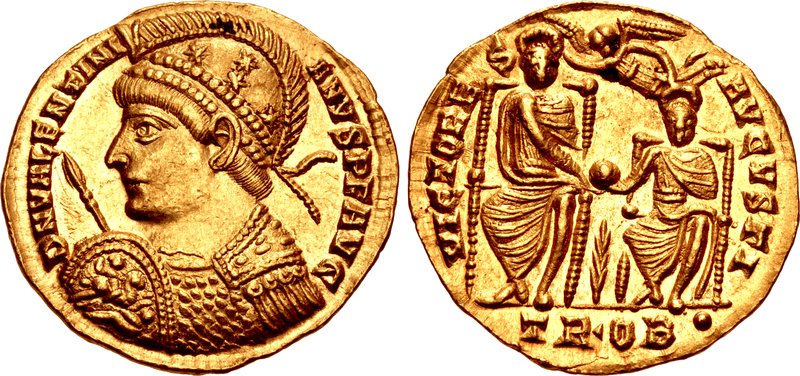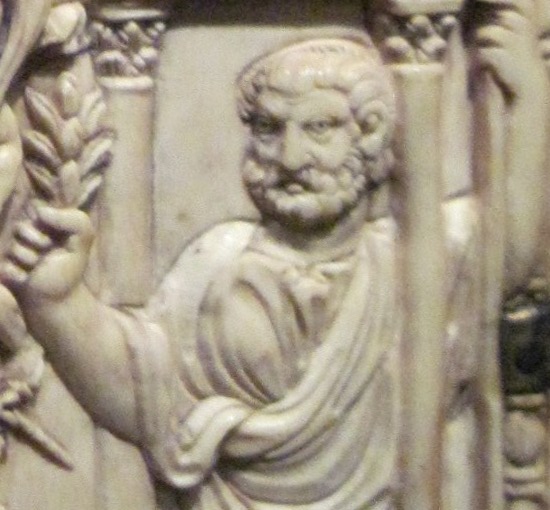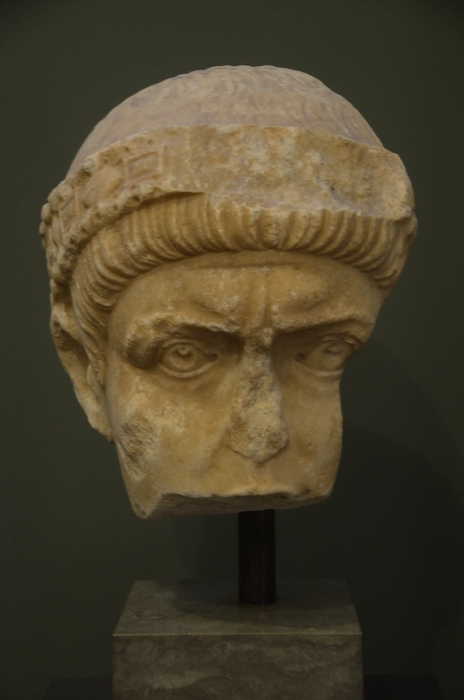|
Ausonius
Decimius Magnus Ausonius (; – c. 395) was a Roman poet and teacher of rhetoric from Burdigala in Aquitaine, modern Bordeaux, France. For a time he was tutor to the future emperor Gratian, who afterwards bestowed the consulship on him. His best-known poems are ''Mosella'', a description of the river Moselle, and ''Ephemeris'', an account of a typical day in his life. His many other verses show his concern for his family, friends, teachers, and circle of well-to-do acquaintances and his delight in the technical handling of meter. Biography Decimius Magnus Ausonius was born in Burdigala, the son of Julius Ausonius (c. AD 290–378), a physician of Greek ancestry,The Cambridge History of Classical Literature, Edward John Kenney, Cambridge University Press, p.16 and Aemilia Aeonia, daughter of Caecilius Argicius Arborius, descended on both sides from established, land-owning Gallo-Roman families of southwestern Gaul. Ausonius was given a strict upbringing by his aunt ... [...More Info...] [...Related Items...] OR: [Wikipedia] [Google] [Baidu] |
Moselle
The Moselle ( , ; german: Mosel ; lb, Musel ) is a river that rises in the Vosges mountains and flows through north-eastern France and Luxembourg to western Germany. It is a left bank tributary of the Rhine, which it joins at Koblenz. A small part of Belgium is in its basin as it includes the Sauer and the Our. Its lower course "twists and turns its way between Trier and Koblenz along one of Germany's most beautiful river valleys."''Moselle: Holidays in one of Germany's most beautiful river valleys'' at www.romantic-germany.info. Retrieved 23 Jan 2016. In this section the land to the north is the Eifel which stretches into |
Gratian
Gratian (; la, Gratianus; 18 April 359 – 25 August 383) was emperor of the Western Roman Empire from 367 to 383. The eldest son of Valentinian I, Gratian accompanied his father on several campaigns along the Rhine and Danube frontiers and was raised to the rank of ''Augustus'' in 367. Upon the death of Valentinian in 375, Gratian took over government of the west while his half-brother Valentinian II was also acclaimed emperor in Pannonia. Gratian governed the western provinces of the empire, while his uncle Valens was already the emperor over the east. Gratian subsequently led a campaign across the Rhine, attacked the Lentienses, and forced the tribe to surrender. That same year, the eastern emperor Valens was killed fighting the Goths at the Battle of Adrianople, which led to Gratian elevating Theodosius to replace him in 379. Gratian favoured Nicene Christianity over traditional Roman religion, issuing the Edict of Thessalonica, refusing the office of '' pontifex m ... [...More Info...] [...Related Items...] OR: [Wikipedia] [Google] [Baidu] |
Gratianus
Gratian (; la, Gratianus; 18 April 359 – 25 August 383) was emperor of the Western Roman Empire from 367 to 383. The eldest son of Valentinian I, Gratian accompanied his father on several campaigns along the Rhine and Danube frontiers and was raised to the rank of ''Augustus'' in 367. Upon the death of Valentinian in 375, Gratian took over government of the west while his half-brother Valentinian II was also acclaimed emperor in Pannonia. Gratian governed the western provinces of the empire, while his uncle Valens was already the emperor over the east. Gratian subsequently led a campaign across the Rhine, attacked the Lentienses, and forced the tribe to surrender. That same year, the eastern emperor Valens was killed fighting the Goths at the Battle of Adrianople, which led to Gratian elevating Theodosius to replace him in 379. Gratian favoured Nicene Christianity over traditional Roman religion, issuing the Edict of Thessalonica, refusing the office of '' pontifex max ... [...More Info...] [...Related Items...] OR: [Wikipedia] [Google] [Baidu] |
Bordeaux
Bordeaux ( , ; Gascon oc, Bordèu ; eu, Bordele; it, Bordò; es, Burdeos) is a port city on the river Garonne in the Gironde department, Southwestern France. It is the capital of the Nouvelle-Aquitaine region, as well as the prefecture of the Gironde department. Its inhabitants are called ''"Bordelais"'' (masculine) or ''"Bordelaises"'' (feminine). The term "Bordelais" may also refer to the city and its surrounding region. The city of Bordeaux proper had a population of 260,958 in 2019 within its small municipal territory of , With its 27 suburban municipalities it forms the Bordeaux Metropolis, in charge of metropolitan issues. With a population of 814,049 at the Jan. 2019 census. it is the fifth most populated in France, after Paris, Lyon, Marseille and Lille and ahead of Toulouse. Together with its suburbs and exurbs, except satellite cities of Arcachon and Libourne, the Bordeaux metropolitan area had a population of 1,363,711 that same year (Jan. 2019 census), ... [...More Info...] [...Related Items...] OR: [Wikipedia] [Google] [Baidu] |
Aemilia Hilaria
Aemilia Hilaria (c. 300 – c. 363) was a Gallo-Roman physician. She practiced medicine, and wrote books on gynecology and obstetrics. She was called "Hilaria" due to her cheerfulness as a baby. Early life Aemilia was born in the Roman Empire, the area of present Moselle, France. She was the daughter of Caecilius Agricius Arborius and Aemilia Corinthia Maura, both poor nobles from Gaul. Physician She continued to live in the area as an adult and became a physician there. Aemilia was the maternal aunt of Ausonius, a Gallo-Roman senator who became tutor to the Emperor Gratian. Ausonius wrote a series of biographical poems about his family members, including Ameilia, called ''Parentalia''. Everything we know today about Aemilia and her family comes from ''Parentalia''. His poem about his aunt described her as a "dedicated virgin", who rejected marriage in order to further her career. He described her as "trained in the medical arts as well as any man." He called her an honest and ... [...More Info...] [...Related Items...] OR: [Wikipedia] [Google] [Baidu] |
Quintus Aurelius Symmachus
Quintus Aurelius Symmachus signo Eusebius (, ; c. 345 – 402) was a Roman statesman, orator, and man of letters. He held the offices of governor of proconsular Africa in 373, urban prefect of Rome in 384 and 385, and consul in 391. Symmachus sought to preserve the traditional religions of Rome at a time when the aristocracy was converting to Christianity, and led an unsuccessful delegation of protest against Emperor Gratian's order to remove the Altar of Victory from the curia, the principal meeting place of the Roman Senate in the Forum Romanum. Two years later he made a famous appeal to Gratian's successor, Valentinian II, in a dispatch that was rebutted by Ambrose, the bishop of Milan. Symmachus's career was temporarily derailed when he supported the short-lived usurper Magnus Maximus, but he was rehabilitated and three years later appointed consul. After the death of Theodosius I, he became an ally of Stilicho, the guardian of emperor Honorius. In collaboration wit ... [...More Info...] [...Related Items...] OR: [Wikipedia] [Google] [Baidu] |
Burdigala
Bordeaux ( , ; Gascon oc, Bordèu ; eu, Bordele; it, Bordò; es, Burdeos) is a port city on the river Garonne in the Gironde department, Southwestern France. It is the capital of the Nouvelle-Aquitaine region, as well as the prefecture of the Gironde department. Its inhabitants are called ''"Bordelais"'' (masculine) or ''"Bordelaises"'' (feminine). The term "Bordelais" may also refer to the city and its surrounding region. The city of Bordeaux proper had a population of 260,958 in 2019 within its small municipal territory of , With its 27 suburban municipalities it forms the Bordeaux Metropolis, in charge of metropolitan issues. With a population of 814,049 at the Jan. 2019 census. it is the fifth most populated in France, after Paris, Lyon, Marseille and Lille and ahead of Toulouse. Together with its suburbs and exurbs, except satellite cities of Arcachon and Libourne, the Bordeaux metropolitan area had a population of 1,363,711 that same year (Jan. 2019 census), mak ... [...More Info...] [...Related Items...] OR: [Wikipedia] [Google] [Baidu] |
Paulinus Of Pella
Paulinus of Pella (377 – after 461) was a Christian poet of the fifth century. He wrote the autobiographical poem ''Eucharisticos'' ("Thanksgiving"). His poem is frequently used as an example of life in Gaul in the fifth century during the waning days of the Western Roman Empire. Life Paulinus was the son of Thalassius, and the grandson of the poet Ausonius. Paulinus was born at Pella in Macedon while his father was ''vicarius'' of Macedonia. Thalassius then succeeded his brother-in-law Decimius Hilarianus Hesperius as proconsul of Africa in 378. Thalassius brought his son Paulinus to Carthage when the latter was less than nine months old. He grew up far more familiar with Greek -- which he picked up from the household servants—than his native Latin. His education began first with Greek classics including Plato and Homer; when he was introduced to Vergil, he recalls how he "could not catch the beauty and elegance of this foreign language." Just as he was beginning to sh ... [...More Info...] [...Related Items...] OR: [Wikipedia] [Google] [Baidu] |
Bissula
Bissula (flourished in 4th century AD) was an Alemannic woman in the 4th century. She was captured by the Romans in 368 at a young age, and became a slave of the Roman poet Ausonius Decimius Magnus Ausonius (; – c. 395) was a Roman poet and teacher of rhetoric from Burdigala in Aquitaine, modern Bordeaux, France. For a time he was tutor to the future emperor Gratian, who afterwards bestowed the consulship on him .... Ausonius fell deeply in love with Bissula, and released her from slavery. He wrote a poem on her, ''de Bissula'' ("About Bissula"), which he sent to his friend Paulus. Sources Latin textof beginning of the main part. Click on Next for the next part. a German translation by M. W. Besser, 1908 * Friedrich Marx: Ausonius 3. In: Paulys Realencyclopädie der classischen Altertumswissenschaft (RE). Band II,2, Stuttgart 1896, Sp. 2562–2580, hier Sp. 2564 und Sp. 2571. * Felix Dahn: Gesammelte Werke. Erste Serie, Band 3. Berlin 1884. 4th-century Germanic ... [...More Info...] [...Related Items...] OR: [Wikipedia] [Google] [Baidu] |
Aemilius Magnus Arborius
Aemilius Magnus Arborius (4th century) was a Gallo-Roman Latin poet and professor. He was the author of a poem in ninety-two lines in elegiac verse, titled ''Ad Nympham nimis cultam'', which cleverly alludes to Classical authors. The poem was reprinted in several later anthologies. Arborious was a rhetorician at Tolosa (Toulouse) in Gaul. He was the maternal uncle of the poet Ausonius, who in his ''Parentalia'' praises him and mentions that he enjoyed the friendship of the brothers of emperor Constantine I, when they lived at Tolosa, and was afterwards called to Constantinople to superintend the education of one of the Caesars.Ausonius. ''Parent''. iii., ''Profess.'' xvi. References Roman-era poets 4th-century Roman poets 4th-century Gallo-Roman people Magnus Arborius Magnus, meaning "Great" in Latin, was used as cognomen of Gnaeus Pompeius Magnus in the first century BC. The best-known use of the name during the Roman Empire is for the fourth-century Western Roma ... [...More Info...] [...Related Items...] OR: [Wikipedia] [Google] [Baidu] |
Latin Literature
Latin literature includes the essays, histories, poems, plays, and other writings written in the Latin language. The beginning of formal Latin literature dates to 240 BC, when the first stage play in Latin was performed in Rome. Latin literature would flourish for the next six centuries. The classical era of Latin literature can be roughly divided into the following periods: Early Latin literature, The Golden Age, The Imperial Period and Late Antiquity. Latin was the language of the ancient Romans, but it was also the '' lingua franca'' of Western and Central Europe throughout the Middle Ages, so Latin literature includes not only Roman authors like Cicero, Virgil, Ovid and Horace, but also includes European writers after the fall of the Empire, from religious writers like Aquinas (1225–1274), to secular writers like Francis Bacon (1561–1626), Baruch Spinoza (1632–1677), and Isaac Newton (1642–1727). History Early Latin literature Although literature in ... [...More Info...] [...Related Items...] OR: [Wikipedia] [Google] [Baidu] |
Valentinian I
Valentinian I ( la, Valentinianus; 32117 November 375), sometimes called Valentinian the Great, was Roman emperor from 364 to 375. Upon becoming emperor, he made his brother Valens his co-emperor, giving him rule of the eastern provinces. Valentinian retained the west. During his reign, Valentinian fought successfully against the Alamanni, Quadi, and Sarmatians. Most notable was his victory over the Alamanni in 367 at the Battle of Solicinium. His general Count Theodosius defeated a revolt in Africa and the Great Conspiracy, a coordinated assault on Roman Britain by Picts, Scots, and Saxons. Valentinian was also the last emperor to conduct campaigns across both the Rhine and Danube rivers. Valentinian rebuilt and improved the fortifications along the frontiers, even building fortresses in enemy territory. He founded the Valentinianic dynasty, with his sons Gratian and Valentinian II succeeding him in the western half of the empire. Early life Valentinian was born in 32 ... [...More Info...] [...Related Items...] OR: [Wikipedia] [Google] [Baidu] |



.jpg)




